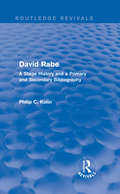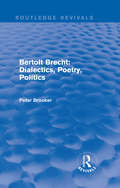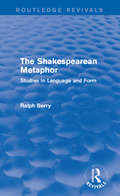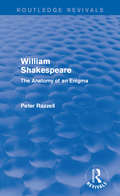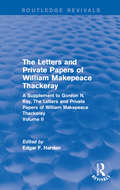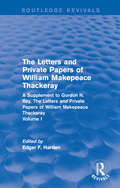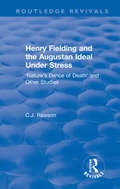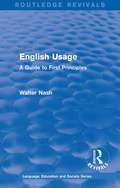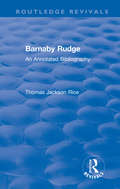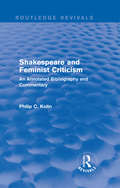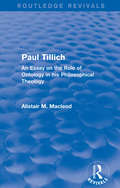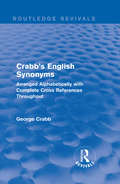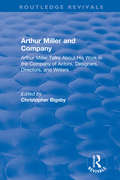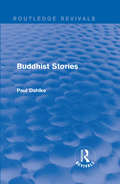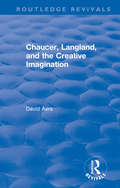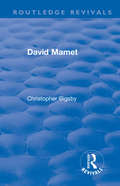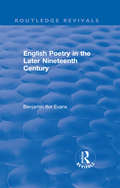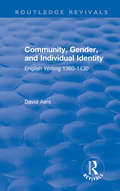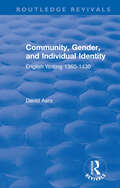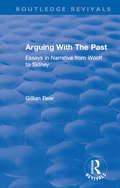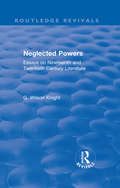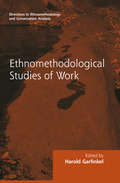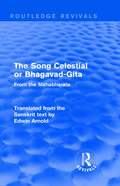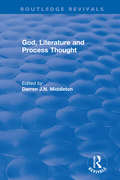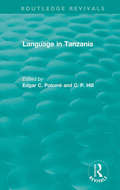- Table View
- List View
Routledge Revivals (1988): A Stage History and a Primary and Secondary Bibliography
by Philip C. KolinIn the twenty years that preceded the publication of this book in 1988, David Rabe was in the vanguard of playwrights who shaped American theatre. As the first full-length work on Rabe, this book laid the groundwork for later critical and biographical studies. The first part consists of an essay that covers three sections: a short biography, a summary and evaluation of his formative journalism for the New Haven Register, and a detailed and cohesive stage history of his work. The second part presents the most comprehensive and authoritative primary bibliography of Rabe to date, with the third section containing a secondary bibliography — including a section on biographical studies.
Routledge Revivals (1988): Dialectics, Poetry, Politics
by Peter BrookerFirst published in 1988, this books argues with received accounts to reclaim Brecht’s emphasis on his self-described ‘dialectical theatre’, re-examining firstly the concepts of Gestus and Verfremdung and their realisation in Brecht’s poetry in terms of his attempt to consciously apply the methods of dialectical materialism to art and cultural practice. The author also takes issue with the customary view of Brecht’s career and politics which sees him as compromising either with Communist party dogma or bourgeois aesthetics, to find developing parallels between Brecht’s political and artistic though and the critical dialectics of Marx, Lenin and Mao. This development is examined in later chapters in relation to the early and late plays, The Measures Taken and Days of the Commune as well as in relation to Brecht’s changed circumstances in the years of war-time exile and in post-war East Germany.
Routledge Revivals (1990): Studies in Language and Form
by Ralph BerryFirst published in 1978, this book represents a study of the ways in which Shakespeare exploits the possibilities of metaphor. In a series of studies ranging from the early to the mature Shakespeare, the author concentrates on metaphor as a controlling structure — the extent to which a certain metaphoric idea informs and organises the drama. These studies turn constantly to the relations between symbol and metaphor, literal and figurative, and examine key plays such as Richard III, King John, Henry V, Romeo and Juliet, Troilus and Cressida, and Coriolanus. They also provide a key to The Tempest which is analysed in terms of power and possession — the dominant motif.
Routledge Revivals (1990): The Anatomy of an Enigma
by P. E. RazzellFirst published in 1990, the aim of this book is to reveal the William Shakespeare whose life has been obscured by centuries of literary mythology. It unravels a series of strands in order to understand the man and the major influences which shaped his life and writing. The first part advances the thesis that his relationship with his father directly influenced the character of Falstaff — helping to not only explain key events in his father’s life but also critical events in his own biography. This thesis not only illuminates the Falstaff plays but also a number of other works such as Hamlet. The second part focuses on Shakespeare’s own life, and includes much original research particularly on the tradition that he was a poacher of deer, discussing the influence this incident had on his later life and writings. In addition, a sociological approach has been used which illuminates a number of key areas, including questioning the view his background was narrow and provincial — which has often been used to dispute his authorship of plays of such cosmopolitan appeal.
Routledge Revivals (1994): A Supplement to Gordon N. Ray, The Letters and Private Papers of William Makepeace Thackeray
by Edgar F. HardenFirst published in 1994, these two volumes are intended as a supplement to the four-volume edition edited by Gordon N. Ray in 1945-46. In writing to his broad range of correspondents, Thackeray produced a varied body of letters that will help readers to better understand his nineteenth-century society as well as his professional and private life — especially his relationships with women. These volumes contain 1713 letters: 1464 to and from Thackeray that were not included in the earlier volumes, and 249 with texts that have been edited from newly available manuscripts, and that thereby replace texts that were printed in Ray from incomplete sources.
Routledge Revivals (1994): A Supplement to Gordon N. Ray, The Letters and Private Papers of William Makepeace Thackeray
by Edgar F. HardenFirst published in 1994, these two volumes are intended as a supplement to the four-volume edition edited by Gordon N. Ray in 1945-46. In writing to his broad range of correspondents, Thackeray produced a varied body of letters that will help readers to better understand his nineteenth-century society as well as his professional and private life — especially his relationships with women. These volumes contain 1713 letters: 1464 to and from Thackeray that were not included in the earlier volumes, and 249 with texts that have been edited from newly available manuscripts, and that thereby replace texts that were printed in Ray from incomplete sources.
Routledge Revivals: 'Nature's Dance of Death' and Other Studies (Routledge Revivals)
by Claude RawsonOriginally published in 1972, Henry Fielding and the Augustan Ideal Under Stress, focuses upon the various disruptive forces in the literary culture of the Augustan period – upon ‘Nature’s Dance of Death’. His discussion centres on aspects of Fielding’s writing in relation to Augustan culture and civilization. He also relates the works of such Augustans as Pope, Swift and Smollett, as well as some twentieth century writings, to his overall theme. He treats, among other topics the crises in stylistic ‘urbanity’ and in the ‘mock-heroic’ styles of this historically and artistically fascinating period.
Routledge Revivals: A Guide to First Principles (Routledge Revivals: Language, Education and Society Series #3)
by Walter NashFirst published in 1986, this book examines the changing patterns in English usage and style. It encourages a constructive attitude to language, demonstrating the creative resources of grammar, discussing in detail the options of written style, and challenging the authoritarian spirit that inhibits usage. The central chapters are concerned with written usage, and pay close attention to questions of syntax and punctuation. The sense of writing, however, is always related to speech, and the value of usage as a social act is emphasised in the exploration of style as an individual function. Technical terms are explained and the text is illustrated with examples from literature and journalism.
Routledge Revivals: An Annotated Bibliography (Routledge Revivals)
by Thomas Jackson RiceOriginally published in 1987 Barnaby Rudge is a comprehensive collection of bibliographical resources surrounding Dickens fifth novel Barnaby Rudge. The book addresses what the author terms, a ‘prevalent lack of research’ surrounding the novel. The collection lists bibliographic references which not only looks at the novel itself, but also covers older resources that interested Dicken’s first critics, such as the originality of the settings and characters. The book’s core focus is examining the novel’s historical subject matter in the context of the social and political context in which it was written. The book acts as a core resource for research on Barnaby Rudge.
Routledge Revivals: An Annotated Bibliography and Commentary (Routledge Revivals)
by Philip C KolinFirst published in 1991, this book is the first annotated bibliography of feminist Shakespeare criticism from 1975 to 1988 — a period that saw a remarkable amount of ground-breaking work. While the primary focus is on feminist studies of Shakespeare, it also includes wide-ranging works on language, desire, role-playing, theatre conventions, marriage, and Elizabethan and Jacobean culture — shedding light on Shakespeare’s views on and representation of women, sex and gender. Accompanying the 439 entries are extensive, informative annotations that strive to maintain the original author’s perspective, supplying a careful and thorough account of the main points of an article.
Routledge Revivals: An Essay on the Role of Ontology in his Philosophical Theology (Routledge Revivals)
by Alistair M. MacleodFirst published in 1973, this is the first book on Paul Tillich in which a sustained attempt is made to sort out and evaluate the questions to which Tillich addresses himself in the crucial philosophical parts of his theological system. It is argued that despite the apparent simplicity in his interest in the ‘question of being’, Tillich in fact conceives of the ontological enterprise in a number of radically different ways in different contexts. Much of the author's work is devoted to the careful separation of these strands in his philosophical thought and to an exploration and assessment of the assumptions associated with them. This book will be of interest to readers of Tillich and philosophers who specialise in ontology and linguistics.
Routledge Revivals: Arranged Alphabetically with Complete Cross References Throughout (Routledge Revivals)
by George CrabbFirst published in 1816 and revised in 1916, this edition of George Crabb’s English Synonyms contains the entirety of his most enduring work. The revised edition is supplemented by a large number of words, the applications of which had grown into the language in the preceding years or had taken on a deeper significance in light of the First World War. It also contains comprehensive cross-referencing, which brings closely related words together and facilitates the quick location of a desired term.
Routledge Revivals: Arthur Miller Talks About His Work in the Company of Actors, Designers, Directors, and Writers (Routledge Revivals)
by C.W.E. BigsbyFirst published in 1990, this book presents a discussion with Arthur Miller, in conversation with Christopher Bigsby. Miller talks openly and extensively about his own life and experiences, events and environments which provide material for his plays: his New York childhood, the Depression, the McCarthy witch-hunts. He discusses in depth both the technique of his writing and the moral and political questions which his plays address, and argues passionately for the importance of maintaining respect for human values in a world where they are so frequently transgressed. Interwoven with these conversations are contributions from actors, directors, designers, reviewers, and writers who have encountered Miller over the years – whether in person or through his plays – which attest to the universal and enduring importance of his work.
Routledge Revivals: Buddhist Stories (Routledge Revivals)
by Paul DahlkeFirst published in 1913, this book presents a translation of five stories written by the the author. Each of the five stories illustrates and elucidates central concepts in Buddhist philosophy while eschewing any technical terminology. As such, this book is ideal for those seeking an accessible introduction to Buddhist philosophy and will provide a platform for further study.
Routledge Revivals: Chaucer, Langland, and the Creative Imagination (Routledge Revivals)
by David AersFirst published in 1980, this study of two renowned later fourteenth century English poets, Chaucer and Langland, concentrates on some major and representative aspects of their work. Aers shows that, in contrast to the mass conventional writing of the period, which was happy to accept and propagate traditional ideologies, Chaucer and Langland were preoccupied with actual conflicts, strains, and developments in received ideologies and social practices. He demonstrates that they were genuinely exploratory, and created work which actively questioned dominant ideologies, even those which they themselves revered and hoped to affirm. For Chaucer and Langland the imagination was indeed creative, involved in the active construction of meanings, and in their poetry they grasped and explored social commitments, religious developments and many perplexing contradictions which were subverting inherited paradigms.
Routledge Revivals: David Mamet (Routledge Revivals)
by Christopher BigsbyFirst published in 1985, C.W.E Bigsby examines the career and work of playwright David Mamet. Bigsby shows that Mamet is a fierce social critic, indicting an America corrupted at its core by myths of frontier individualism and competitive capitalism. Mamet has created plays whose bleak social vision and ironic metaphysics are redeemed, if at all, by the power of imagination. No American playwright before him has displayed the same sensitivity to language, detecting lyricism in the brutal incoherencies of every day speech and investing with meaning a contemporary aphasia. Few have offered dramatic metaphors of such startling and disturbing originality. Bigsby’s study is the first book to provide a thorough account of David Mamet’s life and career, as well as close analyses of individual plays.
Routledge Revivals: English Poetry in the Later Nineteenth Century (Routledge Revivals)
by B. Ifor EvansFirst published in 1933, this study, which underwent revision in the 1960s, is a comprehensive survey of the verse of English nineteenth-century poets whose work appeared after 1860. A special feature is the full and critical treatment of minor writers. In no other book is their work so carefully evaluated. There is a full account of the minor Pre-Raphaelites, of James Thomson, the poet of The City of Dreadful Night, of Henley, Stevenson and George MacDonald. John Davidson is the subject of a long and revealing study. Evans suggests that poetry from the late nineteenth century is neglected in scholarly study, and that Victorian Romanticism deserves more attention than it has recently received.
Routledge Revivals: English Writing 1360-1430 (Routledge Revivals)
by David AersFirst published in 1988, David Aers explores the treatment of community, gender, and individual identity in English writing between 1360 and 1430, focusing on Margery Kempe, Langland, Chaucer, and the poet of Sir Gawain. He shows how these texts deal with questions about gender, the making of individual identity, and competing versions of community in ways which still speak powerfully in contemporary analysis of gender formation, sexuality, and love. Making wide use of recent research on the English economy and communities, and informed by current debates in the theory of culture and gender, the book will be of interest to those concerned with Medieval studies, Renaissance studies, and Women’s studies.
Routledge Revivals: English Writing 1360-1430 (Routledge Revivals)
by David AersFirst published in 1988, David Aers explores the treatment of community, gender, and individual identity in English writing between 1360 and 1430, focusing on Margery Kempe, Langland, Chaucer, and the poet of Sir Gawain. He shows how these texts deal with questions about gender, the making of individual identity, and competing versions of community in ways which still speak powerfully in contemporary analysis of gender formation, sexuality, and love. Making wide use of recent research on the English economy and communities, and informed by current debates in the theory of culture and gender, the book will be of interest to those concerned with medieval studies, Renaissance studies, and women’s studies.
Routledge Revivals: Essays in Narrative from Woolf to Sidney (Routledge Revivals)
by Gillian BeerFirst published in 1989, this book analyses fiction and long narrative, drawing on a broad range of writing from earlier periods and on recent narrative theory. Gillian Beer looks at the work of writers as diverse as Thomas Carlyle and Philip Sydney, Samuel Richardson, and George Eliot. Three chapters on Virginia Woolf demonstrate how Woolf’s reading of past literature, philosophy, and science gave her an intellectual and emotional purchase on problems of feminism and modernism. Beer examines how writers create dialogues with past writing, how readers of the present day engage with the difference of past literature, and how we make contact with the desires and debates of past readers.
Routledge Revivals: Essays on Nineteenth and Twentieth Century Literature (Routledge Revivals)
by G. Wilson KnightFirst published in 1971, Professor Knight’s book draws analytic attention to poets including Tennyson, Masefield, and Brooke, who are shown to hold a dimension of meaning previously ignored or misunderstood. Homage is paid to John Cowper Powys as one of the foremost seers of the modern age. A comprehensive review of the work of Francis Berry claims to establish him as our foremost living poet. Professor Knight urges, and goes far to prove, that modern literary criticism up until the 1970s failed to touch upon the richer meanings of contemporary literature – he stresses the relation between such acclaimed poets as Yeats and Eliot and the spiritualistic movements of contemporary times. Knight regards youth-revolts as a sign of a healthy dissatisfaction with an irreligious and directionless culture, and believes that hope lies in the neglected powers pressing for acceptance.
Routledge Revivals: Ethnomethodological Studies of Work (Directions in Ethnomethodology and Conversation Analysis)
by Harold GarfinkelFirst published in 1986, this collection of essays brings together ethnomethodological studies from key academics of the discipline, including the renowned scholar Harold Garfinkel who established and developed the field. In addition to four case studies, the volume begins and ends with two essays which discuss some of the theory employed by ethnomethodologists. The essays in this collection look at a range of areas, from truck wheel accidents and their regulation, to martial arts and alchemy and provide concise and insightful examples of the ways in which ethnomethodology can be applied to a number of settings and subjects. This work will be of interest to those studying ethnomethodology and sociology.
Routledge Revivals: From the Mahabharata (Routledge Revivals)
by Edwin ArnoldFirst published in 1909, this book presents an English translation of chapters 25-42 of the Bhishma Parva from the epic Sanskrit poem Mahabharata — better known as the Bhagavad-Gita, reckoned as one of the "Five Jewels" of Devanagari literature. The plot consists of a dialogue between Prince Arjuna and Krishna, the Supreme Deity, in a war-chariot prior to a great battle. The conversation that takes place unfolds a philosophical system which remains the prevailing Brahmanic belief, blending the doctrines of Kapila, Patanjali, and the Vedas. Building on a number of preceding translations, this highly-regarded poetic interpretation provides a major work of literature in an accessible popular form.
Routledge Revivals: God Literature And Process Thought (2002) (Routledge Revivals)
by Darren MiddletonOriginally published in 2002 God, Literature and Process Thought looks at the use of God in writing, as a part of the creative advance, immersed in the processes of reality and affected by events in the world. This edited collection outlines and promotes the novel view that there is much to be gained when those who value the insights of process thought ‘encounter’ the many and varied writers of literature and literary theory. It also celebrates the notion of process poesis, a fresh way of reflecting theologically and philosophically that takes account of literary forms and promises to transform creatively the very structure of process thought today.
Routledge Revivals: Language in Tanzania (Routledge Revivals)
by Edgar C. Polomé C. P. HillOriginally published in 1980, Language in Tanzania presents a comprehensive overview of the Survey of Language Use and Language Teaching in Eastern Africa. Using extensive research carried out by an interdisciplinary group of international and local scholars, the survey also covers Ethiopia, Kenya, Uganda and Zambia. The book represents one of the most in-depth sociolinguistic studies carried out on this region at this time. It provides basic linguistic data necessary to policy-makers, administrators, and educators, and will be of interest to those researching the formulation and execution of language policy.
